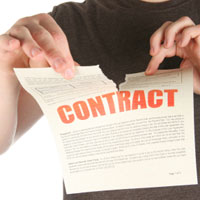When you make an offer to purchase a home, your agent uses a purchase agreement form to enter the terms of your offer to buy the property you have selected.
To be valid, your offer needs to:
- Be in writing and signed by you as the buyer;
- Be definite and certain in detailing the terms for your purchase;
- Show your serious intent to enter into an agreement; and
- Be communicated to the seller who can accept the offer.
Your signing of the purchase agreement which your agent has properly filled out satisfies the first two conditions of terms and intent. To be definite and certain in its terms and conditions for enforcement, your offer needs to:
- Identify you as the buyer, and name the seller;
- Describe the real estate;
- State your price and the form in which you will pay it; and
- Set the time for payment of the price — your full performance.
To be enforceable, the offer does not need to be on any particular form.
However, to be valid, the offer needs to be communicated to the seller for their acceptance.
To communicate your offer, your agent delivers your signed purchase agreement to the seller or the seller’s agent for their consideration.
Neither the seller nor their agent has any legal duty to acknowledge or respond to your offer.
If the seller signs their acceptance of your offer intending to sell, their agent will deliver the signed purchase agreement to you or your agent.
However, if the seller does not accept your offer, your agent needs to urge the seller’s agent to respond with a counteroffer or a formal rejection signed by the seller.
A rejection of your offer occurs when the seller:
- Does nothing and the time for acceptance runs;
- Returns a signed, written rejection stating no counteroffer will be forthcoming; or
- Prepares and submits a counteroffer, using either a counteroffer form or new purchase agreement form stating different terms.
Without first preparing and submitting a counteroffer, the seller may make an inquiry into your willingness to consider different terms. The inquiry for clarifications or changes is not a counteroffer or rejection of your written offer. Such an inquiry does not bar the seller from a later but timely acceptance to form a binding agreement.
However, when the seller attempts to accept your offer by first altering its terms in some way prior to signing the acceptance provision, the change in terms creates a counteroffer to perform on different terms. The written counter is a rejection which terminates your offer.
The seller’s agent has a duty owed to their seller to present every purchase offer they receive, regardless of the terms offered or the form used to present it. However, neither the seller nor their agent has any legal duty to respond to an offer. A failure to respond to an offer does not automatically mean your offer was not presented to the seller. Further, the offer need not be prepared on a form to be enforceable.
In fact, the back of a business card may be used to make an offer. However, provisions in boiler-plate purchase agreement forms state the essential terms and conditions of an offer needed to make it clear, complete and enforceable when accepted.



